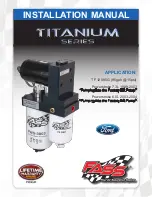
Children too big for child re
straint systems should ride in
rear seats using regular seat
belts. Position shoulder belt
across chest and shoulder, not
face or neck. A booster seat
may be necessary to achieve
proper belt positioning.
When the child restraint is not
in use, remove it from the car
or secure it with the seat belt
to prevent the child restraint
from becoming a projectile in
the event of an accident.
Infant and Child Restraint
Systems
We recommend that all infants
and children be restrained at all
times while the vehicle is in
motion.
Important!
The use of infant or child re
straints is required by law in all
50 states and all Canadian
provinces.
Infants and small children should
be seated in an infant or child
restraint system, which is properly
secured by a lap belt or lap belt
portion of a lap-shoulder belt, and
that complies with U.S. Federal
Motor Vehicle Safety Standard
213 and Canadian Motor Vehicle
Safety Standard 213.1. A state
ment by the child restraint manu
facturer of compliance with this
standard can be found on the
instruction label on the restraint
and in the instruction manual
provided with the restraint.
When using any infant or child
restraint system, be sure to
carefully read and follow all
manufacturer’s instructions for
installation and use.
Warning!
According to accident statis
tics, children are safer when
properly restrained in the rear
seating positions than in the
front seating positions.
Rear-facing child restraints
must not be used in the front
passenger seat. They could be
struck by the airbag when it
inflates in a crash. If this hap
pens, a child in the restraint
could be seriously or fatally
injured.
Infants and small children
should never be held on the
lap while the vehicle is in mo
tion. During an accident they
would be almost impossible to
hold, and could be crushed
between the adult and the
dashboard.
Infants and small children
should never share a seat belt
with another occupant. During
an accident, they could be
crushed between the occupant
and seat belt.
U.S.A. Models only:
Since 1986 all U.S. child restraints
comply with U.S. regulations
without the use of a tether strap.
Canada Models only:
This vehicle is provided with
tether anchorages for a top tether
strap. Consult your authorized
Mercedes-Benz dealer for instal
lation of these anchorages.
In compliance with Canadian
Motor Vehicle Safety Standard
210.1, child restraint tether
anchorage hardware is attached to
the tool kit located in the cargo
area.
Summary of Contents for E 320 1994
Page 1: ...Owner s Manual ...
Page 3: ...Mercedes Benz Owner s Manual 1994 E 320 ...
Page 13: ...11 Instruments and Controls ...
Page 22: ......
Page 70: ......
Page 130: ......
Page 131: ...Index ...
Page 136: ...NOTES 134 ...
Page 137: ...NOTES 135 ...
Page 140: ...Mercedes Benz AG Stuttgart Untertuerkheim ...
Page 141: ......
















































